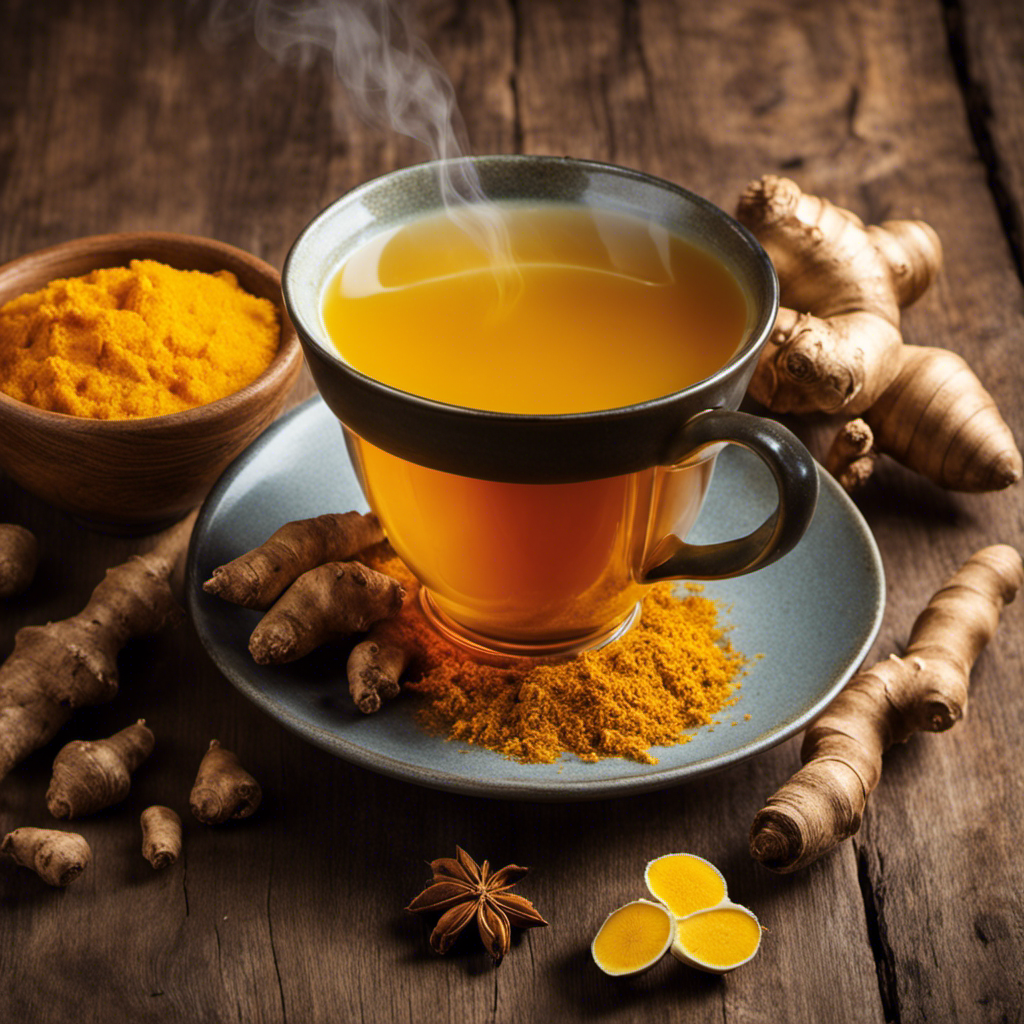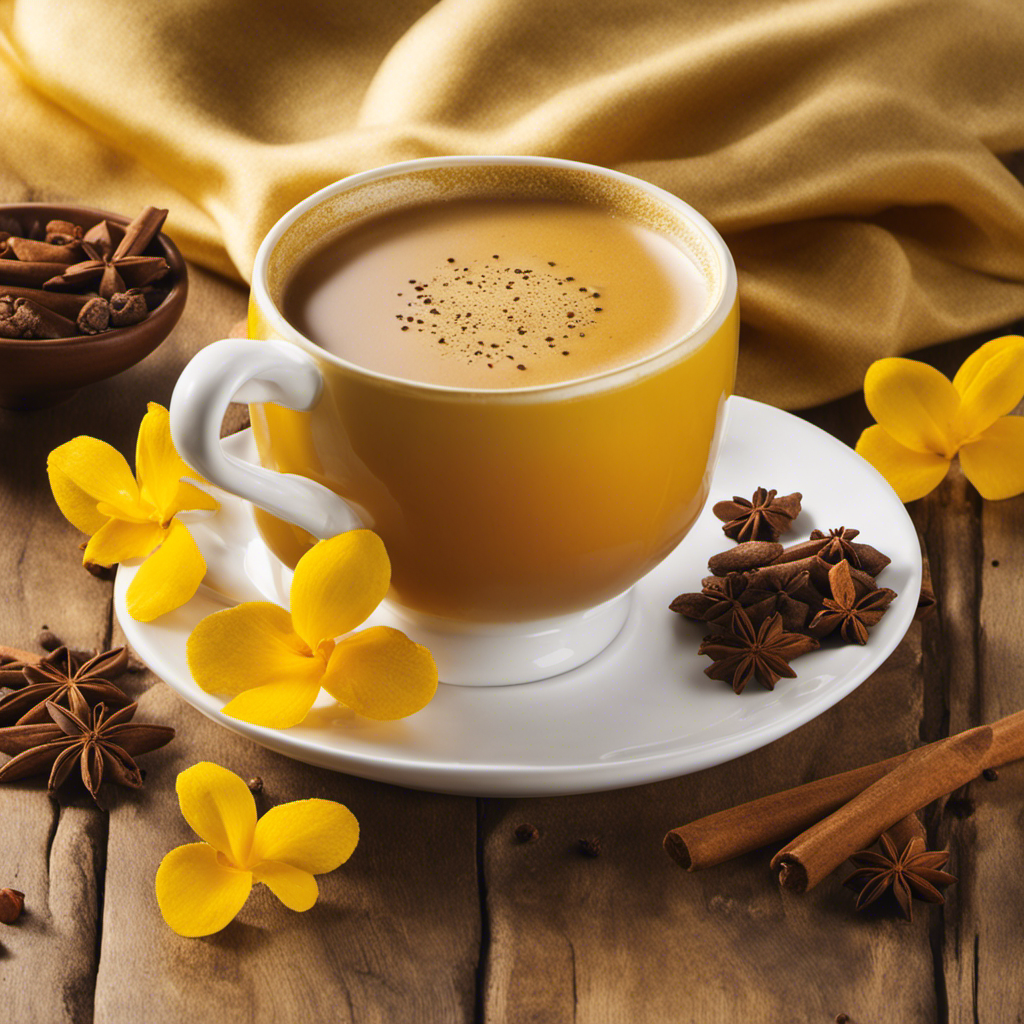Coffee Alternatives And Tea
The Tea Vs Coffee Debate: Which Brew Reigns Supreme?

In the world of hot beverages, the tea vs coffee debate rages on, each brew vying for supremacy. As the saying goes, ‘In the battle of the brews, only one can reign supreme.’
So, which side of the mug do I stand on? Well, as a self-proclaimed aficionado of both tea and coffee, I have carefully examined the benefits and drawbacks of each, delving into the depths of their caffeine content, flavor profiles, and health effects. It is a battle of the senses, where aroma and taste collide with scientific evidence and personal preference.
Join me as we explore the world of tea and coffee, analyzing their diverse flavors, uncovering their potential health benefits, and ultimately determining which brew truly reigns supreme. So, grab your favorite mug, settle in, and prepare to embark on a journey that will leave you with a newfound appreciation for these beloved beverages.
Key Takeaways
- The choice between tea and coffee depends on personal preference.
- Tea is often chosen as an alternative to coffee due to its lower caffeine content and the presence of L-theanine, which provides more stable energy and may increase calmness and improve sleep.
- Tea contains chlorophyll, which has potential health benefits and may help in the treatment of certain diseases and forms of cancer.
- Both tea and coffee have been shown to reduce mortality rates and protect against Alzheimer’s and Parkinson’s diseases.
Benefits and Drawbacks
Tea and coffee both have their benefits and drawbacks, and it’s important to consider them when deciding which brew to enjoy.
The choice between tea and coffee ultimately depends on personal preference and individual needs. Tea offers a variety of flavors and contains beneficial compounds like L-theanine, which provides more stable energy and may increase calmness and improve sleep.
On the other hand, coffee has a higher caffeine content, which can be a drawback for those sensitive to its effects or concerned about sleep quality. While tea is a good option throughout the day, coffee in the afternoon or evening may disrupt sleep due to its higher caffeine content.
It’s essential to find a balance that suits your lifestyle and preferences to reap the benefits while minimizing any drawbacks.
Caffeine Content and Effects
I enjoy the aroma and taste of a freshly brewed cup of coffee, but I’m always mindful of its caffeine content and potential effects on my sleep quality. Caffeine metabolism varies from person to person, and I know that I am sensitive to its stimulating effects.
Consuming coffee in the afternoon or evening can disrupt my sleep, leaving me feeling restless and groggy the next day. This is because caffeine blocks adenosine receptors in the brain, which normally promote sleep. While some individuals may be able to tolerate coffee later in the day without experiencing sleep disturbances, I find that sticking to tea in the afternoon and evening helps me maintain a more restful sleep.
The lower caffeine content in tea, combined with the presence of L-theanine, provides a more stable energy and promotes calmness.
Flavor and Taste Profile
When it comes to flavor and taste, there’s a wide range of options available for both tea and coffee enthusiasts. Here are three factors that contribute to the unique and enjoyable experience of each beverage:
-
Brewing techniques and flavor variations: Tea and coffee offer a multitude of brewing methods and flavor profiles. From delicate floral notes in white tea to robust and earthy flavors in dark roast coffee, there’s something to suit every palate. Experimenting with different brewing techniques, such as steeping times and water temperatures, can further enhance the taste and aroma of both beverages.
-
Aroma and sensory experience: The aroma of tea and coffee is an essential part of the drinking experience. Tea can have subtle floral or grassy scents, while coffee often exudes rich and complex aromas, ranging from fruity to nutty. Additionally, the sensory experience of sipping a hot cup of tea or coffee can be comforting and invigorating, providing a moment of relaxation or stimulation.
The flavor and taste of tea and coffee are influenced by brewing techniques, flavor variations, aromas, and sensory experiences. Exploring the diverse range of options in both beverages can lead to a delightful and satisfying journey for the taste buds.
Health Effects and Disease Prevention
With its potential health benefits and protective effects against certain diseases, a cup of coffee or tea can be a wise choice for maintaining overall well-being. Both beverages have been shown to have an impact on cognitive function, with caffeine in coffee providing a boost in alertness and focus, while tea’s combination of caffeine and L-theanine promotes a more calm and focused state of mind. Additionally, both tea and coffee have been linked to reducing mortality rates, with studies suggesting that regular consumption may help protect against Alzheimer’s and Parkinson’s diseases.
To provide a clearer picture of the health effects and disease prevention associated with tea and coffee, I have created a table below:
| Health Effects and Disease Prevention | Tea | Coffee |
|---|---|---|
| Cognitive function improvement | Yes | Yes |
| Reduced mortality rates | Yes | Yes |
It’s important to note that while both tea and coffee offer health benefits, moderation is key. Drinking excessive amounts of either beverage can lead to caffeine overdose and its associated symptoms. Therefore, it’s best to enjoy tea or coffee in moderation and be mindful of individual caffeine sensitivity and any underlying medical conditions.
Recommendations and Considerations
Considering the various health benefits and personal preferences, it’s important to make informed choices when deciding between tea and coffee.
When it comes to health considerations, moderation is key. It’s recommended to limit caffeine intake to around 400 mg per day for a healthy adult. This means that consuming 5 cups of tea or coffee is unlikely to cause any problems. However, it’s important to be mindful of individual sensitivities and underlying medical conditions.
Additionally, it’s worth noting that brewing techniques can also impact the caffeine content. Brewing black tea with hotter water extracts more caffeine, while using cooler water affects both caffeine levels and flavor. Furthermore, choosing flavored or blended teas and using cooler water for brewing can help reduce caffeine content.
By being mindful of these factors, one can enjoy the health benefits of tea or coffee while making informed choices.
Frequently Asked Questions
What are some alternative options for those who do not enjoy the taste of tea or coffee?
Alternative beverage options for non tea or coffee drinkers include herbal teas, hot chocolate, fruit-infused water, and natural fruit juices. These options provide a variety of flavors and can be enjoyed without the caffeine found in tea and coffee. Is there a difference in caffeine content between tea and coffee?
Can drinking tea or coffee have an impact on dental health?
Drinking tea or coffee can have a significant impact on dental health. Both beverages have the potential to stain teeth and erode enamel over time. It’s important to practice good oral hygiene and limit consumption to minimize these effects.
Are there any specific health conditions or medications that may interact negatively with tea or coffee consumption?
There are specific health conditions and medications that can interact negatively with tea or coffee consumption. For example, individuals with anxiety disorders or certain heart conditions may need to limit their caffeine intake. Additionally, some medications can be affected by caffeine, impacting their effectiveness.
Is it true that drinking tea or coffee on an empty stomach can lead to digestive issues?
Drinking tea or coffee on an empty stomach can potentially lead to digestive issues. It can impact energy levels by providing a quick boost followed by a crash. Additionally, caffeine in both beverages can negatively affect sleep quality.
How does the caffeine content in tea and coffee compare to other popular caffeinated beverages, such as energy drinks or soda?
The caffeine content in tea and coffee is generally lower compared to energy drinks or soda. While tea and coffee can provide a moderate boost in energy, excessive consumption of energy drinks or soda can have negative effects on the body.
Conclusion
In conclusion, after analyzing the benefits and drawbacks, caffeine content and effects, flavor and taste profile, as well as the health effects and disease prevention of both tea and coffee, it is clear that both brews have their own unique advantages.
However, I understand that some may argue that coffee is superior due to its bolder flavor and higher caffeine content. While coffee may provide a quick energy boost, it is important to consider the potential negative effects on cholesterol levels.
Ultimately, the choice between tea and coffee comes down to personal preference and moderation. So, go ahead and savor your favorite brew, but remember to drink it in moderation for the best health benefits.
Noah, the Editor-in-Chief at Cappuccino Oracle, plays a pivotal role in shaping the voice and vision of our renowned platform. With an unwavering passion for coffee, coffee alternatives, and tea, Noah leads Cappuccino Oracle towards new horizons in the realm of coffee journalism.
Beyond his professional responsibilities, Noah serves as a mentor and guiding force for his team. His dedication to journalistic excellence and genuine love for coffee, coffee alternatives, and tea continue to inspire and motivate the Cappuccino Oracle family. In the ever-evolving world of these beverages, Noah’s leadership ensures that our platform remains at the forefront, delivering enlightening and enjoyable content to our readers worldwide.
Turmeric Tea
Vitamins in Turmeric Tea

I have always been intrigued by the effectiveness of natural remedies, and when I came across turmeric tea, I realized I had found something truly unique.
Little did I know, this golden elixir is not only packed with flavor but also loaded with essential vitamins.
In this article, we’ll explore the role of vitamin C, the benefits of vitamin B6, the vitamin K content, the importance of vitamin E, and the incredible combination of vitamin D and turmeric tea.
Get ready to unlock the secrets of these vitamins in turmeric tea and take your health to the next level.
Key Takeaways
- Vitamin C in turmeric tea boosts the immune system and enhances the absorption of curcumin.
- Vitamin B6 in turmeric tea supports brain health, boosts the immune system, and promotes heart health.
- Turmeric tea is a good source of vitamin K, which supports healthy bones, blood clotting, and provides antioxidant protection.
- Vitamin E in turmeric tea acts as a powerful antioxidant, reduces inflammation, and supports overall health and well-being.
The Role of Vitamin C in Turmeric Tea
Vitamin C plays a crucial role in boosting the immune system when consuming turmeric tea. The benefits of vitamin C in turmeric tea cannot be overstated. Vitamin C is known for its powerful antioxidant properties, which help protect the body against free radicals and oxidative stress. These antioxidants also enhance the absorption of turmeric’s active compound, curcumin, which has numerous health benefits.
Vitamin C also supports collagen production, aiding in skin health and wound healing. Furthermore, vitamin C strengthens the immune system by stimulating the production of white blood cells and enhancing their function. This, in turn, improves the body’s ability to fight off infections and diseases.
The impact of vitamin C on turmeric tea’s health benefits is undeniable, making it an essential nutrient to include in your daily diet.
Moving on to vitamin B6, another vital component of turmeric tea.
Vitamin B6 Benefits in Turmeric Tea
You’ll be glad to know that B6 benefits your body in many ways when you enjoy a cup of this golden elixir. Here are some of the benefits of vitamin B6 in turmeric tea:
-
Supports brain health: Vitamin B6 plays a crucial role in the production of neurotransmitters, such as serotonin and dopamine, which regulate mood and cognitive function.
-
Boosts immune system: Vitamin B6 helps in the production of antibodies and white blood cells, which are essential for a strong immune system.
-
Promotes heart health: Vitamin B6 helps in the metabolism of homocysteine, an amino acid that, when elevated, can increase the risk of heart disease.
While turmeric tea can provide a good source of vitamin B6, it is important to note that vitamin B6 deficiency is rare and can usually be prevented through a balanced diet.
Additionally, excessive supplementation of vitamin B6 can lead to potential side effects such as nerve damage, numbness, and tingling. It is always best to consult with a healthcare professional before considering any vitamin B6 supplementation.
Vitamin K Content in Turmeric Tea
The content of K in turmeric tea is worth noting as it contributes to maintaining healthy bones. Vitamin K is a fat-soluble vitamin that plays a crucial role in bone health and blood clotting. It is also known for its antioxidant properties, which help protect cells from damage caused by free radicals. Here is a table highlighting the importance of vitamin K in turmeric tea:
| Vitamin K Benefits in Turmeric Tea |
|---|
| Supports bone health |
| Aids in blood clotting |
| Provides antioxidant protection |
Including turmeric tea in your daily routine can be beneficial in ensuring an adequate intake of vitamin K. As we transition to discussing the importance of vitamin E in turmeric tea, it’s important to note that this vitamin also offers numerous health benefits.
Importance of Vitamin E in Turmeric Tea
Including turmeric tea in your daily routine can be beneficial in ensuring you get enough of the important vitamin E. This powerful antioxidant plays a crucial role in supporting overall health and well-being. Here are three reasons why vitamin E in turmeric tea is so important:
-
Antioxidant properties: Turmeric contains a compound called curcumin, which is known for its potent antioxidant effects. Vitamin E works synergistically with curcumin to neutralize harmful free radicals in the body, protecting cells from oxidative damage.
-
Anti-inflammatory effects: Turmeric tea is renowned for its anti-inflammatory properties, and vitamin E plays a key role in reducing inflammation. Studies have shown that vitamin E can help alleviate symptoms of inflammatory conditions such as arthritis and cardiovascular disease.
-
Skin health: Vitamin E is also beneficial for maintaining healthy skin. It helps in protecting the skin from UV damage, reducing the appearance of scars, and promoting overall skin health.
Incorporating turmeric tea into your daily routine can provide you with the antioxidant benefits of vitamin E and support your overall health and well-being.
Vitamin D and Turmeric Tea: A Powerful Combination
Combining vitamin D with turmeric tea can be a powerful way to boost your overall health and well-being. Vitamin D deficiency is a common problem, especially among those who spend most of their time indoors or live in areas with limited sunlight.
Turmeric tea, on the other hand, is known for its numerous health benefits, including its anti-inflammatory and antioxidant properties. By adding vitamin D to your turmeric tea routine, you can enhance its effects on your immune system, bone health, and mood regulation.
Studies have shown that vitamin D plays a crucial role in supporting the immune system and reducing the risk of chronic diseases. So, incorporating vitamin D into your turmeric tea regimen can provide you with a double dose of health benefits.
Conclusion
In conclusion, turmeric tea is a powerhouse of vitamins that can provide numerous health benefits.
From the immune-boosting properties of vitamin C to the mood-enhancing effects of vitamin B6, this golden elixir is a great addition to your daily routine.
The vitamin K content helps in maintaining healthy bones, while vitamin E acts as a potent antioxidant.
And when combined with vitamin D, turmeric tea becomes even more effective in promoting overall wellness.
As the saying goes, ‘An apple a day keeps the doctor away,’ but a cup of turmeric tea might just do the trick too!
Arf, an author and an innovative enthusiast of coffee, coffee alternatives, and tea, plays a crucial role as a contributor to the esteemed Cappuccino Oracle platform. Renowned for his curiosity and passion for these captivating beverages, Arf has carved out a unique space for himself in the world of exploration and writing. He realized that coffee, coffee alternatives, and tea are not mere drinks to keep one awake, but universes of flavors and stories waiting to be explored.
Arf’s articles for Cappuccino Oracle blend meticulous research with personal experiences, providing readers with an in-depth understanding of various types of coffee, coffee alternatives, and tea, along with their unique characteristics, cultures, and histories. His honest reviews and engaging narratives guide readers on their own journeys, helping them discover their preferences and find their perfect brew.
Turmeric Tea
Hyleys Turmeric With Green Tea Benefits
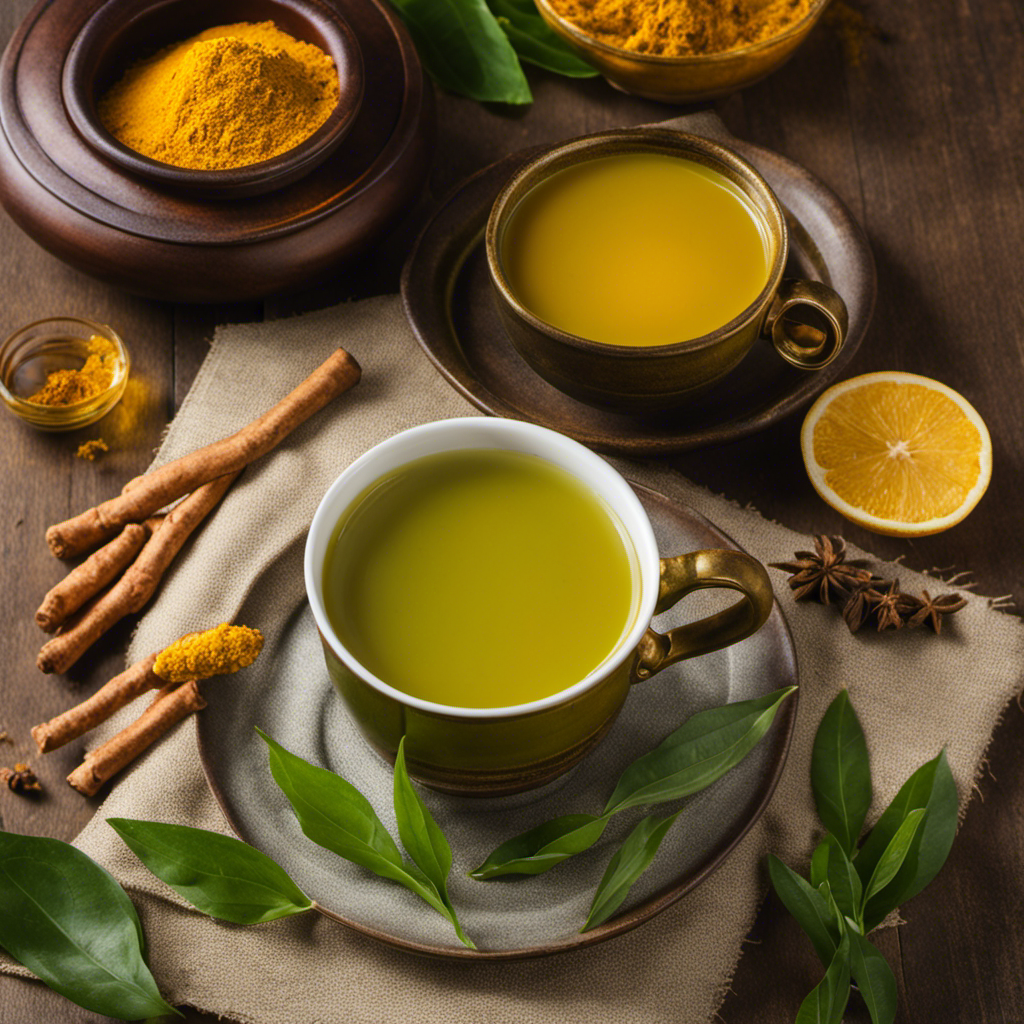
As a passionate tea enthusiast, I am constantly searching for new blends that provide a combination of flavor and health advantages. This is why I was fascinated when I came across Hyleys Turmeric with Green Tea.
This unique combination not only tantalizes the taste buds but also provides a plethora of health benefits. From boosting immunity to managing inflammation, supporting digestive health to promoting heart health, this blend is a powerhouse of wellness.
Join me as we explore the incredible benefits of Hyleys Turmeric with Green Tea.
Key Takeaways
- Hyleys Turmeric with Green Tea provides anti-aging benefits due to its rich antioxidants that neutralize free radicals and reduce oxidative stress.
- The blend of turmeric and green tea in Hyleys Turmeric with Green Tea promotes immune-boosting effects, enhancing the activity of immune cells and improving the immune system’s ability to fight off pathogens.
- Hyleys Turmeric with Green Tea aids in managing inflammation through the natural anti-inflammatory properties of turmeric’s curcumin and the antioxidants in green tea.
- This blend supports digestive health by soothing the digestive tract, reducing discomfort, and promoting the growth of beneficial bacteria in the gut. Additionally, it promotes heart health by reducing inflammation, lowering LDL cholesterol levels, and improving blood vessel function.
Health Benefits of Hyleys Turmeric With Green Tea
You’ll be amazed at the variety of health benefits you can experience from drinking Hyleys Turmeric with Green Tea. This powerful blend offers numerous anti-aging benefits and can aid in weight loss.
Turmeric is well-known for its anti-aging properties, thanks to its high concentration of antioxidants. These antioxidants help to neutralize free radicals in the body, reducing oxidative stress and preventing premature aging.
Green tea is also rich in antioxidants, which can help slow down the aging process and promote youthful skin. Additionally, the combination of turmeric and green tea has been found to support weight loss. Green tea helps to boost metabolism, increase fat oxidation, and reduce appetite, while turmeric aids in digestion and promotes a healthy gut. Together, these ingredients can support weight loss efforts.
Transitioning to the next section, let’s explore how Hyleys Turmeric with Green Tea can boost immunity.
Boosting Immunity With Hyleys Turmeric With Green Tea
To strengthen your immune system, try incorporating this powerful blend into your daily routine.
Hyleys Turmeric with Green Tea is packed with antioxidants and anti-inflammatory properties that can help boost your immunity.
Turmeric, the main ingredient in this blend, contains a compound called curcumin, which has been shown to have immune-boosting effects. Studies have found that curcumin can enhance the activity of immune cells and improve their ability to fight off pathogens.
Adding Hyleys Turmeric with Green Tea to your diet can be as easy as enjoying a cup of tea or incorporating it into your favorite recipes. If you prefer a more concentrated dose, turmeric supplements are also available.
Managing Inflammation With Hyleys Turmeric With Green Tea
If you’re looking for a natural way to manage inflammation, incorporating Hyleys Turmeric with Green Tea into your routine could be a great option.
Turmeric has long been used as a traditional remedy for its natural anti-inflammatory properties. The active component in turmeric, called curcumin, has been shown to have powerful effects in reducing joint pain and inflammation.
Green tea, on the other hand, is rich in antioxidants that can help protect the body against inflammation and oxidative stress.
When combined, turmeric and green tea create a powerful blend that can support the body’s natural ability to manage inflammation.
Supporting Digestive Health With Hyleys Turmeric With Green Tea
By incorporating Hyleys Turmeric with Green Tea into your routine, you can support your digestive health. This powerful combination of turmeric and green tea offers numerous benefits for your digestive system.
Turmeric contains curcumin, a compound known for its anti-inflammatory properties that can help soothe the digestive tract and reduce discomfort. Green tea is rich in antioxidants that promote a healthy gut by reducing inflammation and supporting the growth of beneficial bacteria.
Additionally, green tea has been shown to improve skin health and enhance brain function. It’s important to note that while Hyleys Turmeric with Green Tea can support digestive health, it is not a substitute for a balanced diet and healthy lifestyle.
In the next section, we will explore how Hyleys Turmeric with Green Tea can promote heart health.
Promoting Heart Health With Hyleys Turmeric With Green Tea
Incorporating Hyleys Turmeric with Green Tea into your routine can help support the health of your heart. Here are four ways in which turmeric and green tea can contribute to heart disease prevention and promote cardiovascular health:
-
Reduced inflammation: Turmeric contains a compound called curcumin, which has been shown to have anti-inflammatory properties. Chronic inflammation is known to contribute to heart disease, and by reducing inflammation, turmeric can help protect the heart.
-
Improved cholesterol levels: Green tea has been found to lower LDL cholesterol levels, also known as ‘bad’ cholesterol. High levels of LDL cholesterol can increase the risk of heart disease, and by incorporating green tea into your routine, you can help maintain healthy cholesterol levels.
-
Antioxidant protection: Both turmeric and green tea are rich in antioxidants, which help neutralize harmful free radicals in the body. Free radicals can cause oxidative stress, which can contribute to heart disease. By consuming turmeric and green tea, you can support your heart health by providing it with a powerful dose of antioxidants.
-
Enhanced blood vessel function: Turmeric and green tea have been shown to improve blood vessel function, promoting healthy blood flow and reducing the risk of cardiovascular problems. By incorporating these ingredients into your routine, you can help maintain optimal cardiovascular health.
Conclusion
In conclusion, Hyleys Turmeric with Green Tea is truly a golden elixir for overall health and wellness.
Just like a ray of sunshine piercing through the darkest storm clouds, this powerful blend of turmeric and green tea works wonders for our immunity, inflammation, digestion, and heart health.
With each sip, we are nourishing our bodies with the healing properties of nature, like a gentle breeze caressing our skin on a warm summer day.
So why not embrace this holistic treasure and let it guide us towards a healthier and happier life.
Arf, an author and an innovative enthusiast of coffee, coffee alternatives, and tea, plays a crucial role as a contributor to the esteemed Cappuccino Oracle platform. Renowned for his curiosity and passion for these captivating beverages, Arf has carved out a unique space for himself in the world of exploration and writing. He realized that coffee, coffee alternatives, and tea are not mere drinks to keep one awake, but universes of flavors and stories waiting to be explored.
Arf’s articles for Cappuccino Oracle blend meticulous research with personal experiences, providing readers with an in-depth understanding of various types of coffee, coffee alternatives, and tea, along with their unique characteristics, cultures, and histories. His honest reviews and engaging narratives guide readers on their own journeys, helping them discover their preferences and find their perfect brew.
Turmeric Tea
Ginger, Lemon, Turmeric Tea + Jamie Oliver
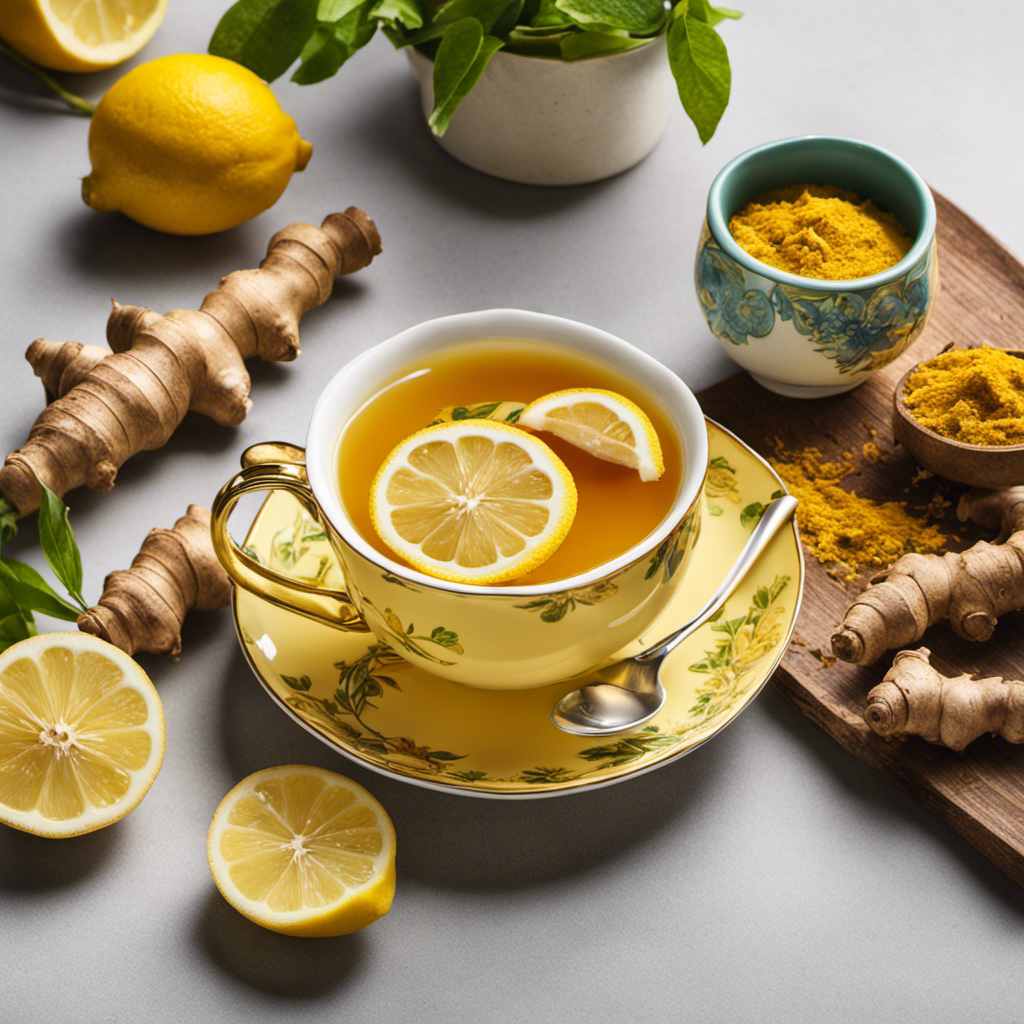
I have something special for you! If you’re searching for a drink that will revolutionize your beverage experience with its delightful taste and amazing health benefits, prepare to be amazed by ginger, lemon, and turmeric tea.
Trust me, this golden elixir is a game-changer. And guess what? Even the culinary guru himself, Jamie Oliver, has jumped on the bandwagon.
In this article, we’ll explore the wonders of this magical tea and discover Jamie’s unique take on it. Get ready to sip your way to better health!
Key Takeaways
- Ginger, lemon, and turmeric tea boosts the immune system and supports natural detoxification.
- Ginger has anti-inflammatory properties, while lemon strengthens the immune system and turmeric has antioxidant and anti-inflammatory effects.
- Jamie Oliver recommends blending ginger, lemon, and turmeric for flavor and health benefits.
- Variations and additions to the tea include mint, cinnamon, cardamom, cloves, and black pepper, which enhance the taste and provide additional health benefits.
Health Benefits of Ginger, Lemon, and Turmeric Tea
You’ll love the health benefits of ginger, lemon, and turmeric tea. This refreshing beverage is not only delicious, but it also has incredible immune-boosting properties and aids in natural detoxification.
Ginger, known for its anti-inflammatory properties, can help reduce inflammation in the body and support a healthy immune system.
Lemon, rich in vitamin C, is a powerful antioxidant and helps strengthen the immune system.
Turmeric, with its active compound curcumin, has been shown to have anti-inflammatory and antioxidant effects, contributing to overall health and well-being.
Combined, these ingredients create a potent tea that can help boost your immune system and promote natural detoxification.
Jamie Oliver’s Take on Ginger, Lemon, and Turmeric Tea
If you’re seeking a fresh take on blending zesty and aromatic ingredients, try incorporating Jamie Oliver’s recipe into your routine.
Jamie Oliver, a renowned chef and advocate for healthy eating, has his own recommended tea brewing method that combines the flavors of ginger, lemon, and turmeric.
These ingredients not only add a burst of flavor but also offer numerous health benefits. Ginger is known for its anti-inflammatory properties, lemon is rich in vitamin C and antioxidants, while turmeric contains curcumin, a compound with powerful antioxidant and anti-inflammatory effects.
Jamie Oliver’s favorite tea flavors include a combination of these ingredients, creating a delightful and invigorating beverage.
Remember, moderation is key when it comes to herbal remedies, as individual differences can play a role in how our bodies respond.
How to Make the Perfect Cup of Ginger, Lemon, and Turmeric Tea
To make the perfect cup of this invigorating beverage, simply blend zesty and aromatic ingredients according to Jamie Oliver’s recommended tea brewing method.
Ginger, lemon, and turmeric tea offers a myriad of health benefits. Ginger is known for its anti-inflammatory properties and can help with digestion and nausea. Lemon is packed with vitamin C and antioxidants, which boost the immune system and promote healthy skin. Turmeric contains curcumin, a powerful compound with anti-inflammatory and antioxidant effects.
Combined, these ingredients create a flavorful and nutritious tea. To prepare, grate ginger and turmeric, squeeze fresh lemon juice, and steep in hot water for 5-10 minutes. You can also add honey or a pinch of black pepper for added taste and benefits.
Remember to enjoy in moderation and consult a healthcare professional for personalized advice.
Variations and Additions to Ginger, Lemon, and Turmeric Tea
For a twist on this invigorating beverage, try experimenting with different herbs and spices to create your own unique blend of flavors. Adding herbs and spices to your ginger, lemon, and turmeric tea not only enhances the taste but also provides additional health benefits. Here are five flavorful options to consider:
- Mint: Refreshing and soothing, mint adds a cool and invigorating element to your tea.
- Cinnamon: Known for its warming properties, cinnamon adds a hint of sweetness and depth to the flavor profile.
- Cardamom: With its unique and aromatic taste, cardamom complements the earthy notes of ginger and turmeric.
- Cloves: Adding a warm and spicy flavor, cloves provide antioxidant and anti-inflammatory properties.
- Black pepper: A pinch of black pepper enhances the bioavailability of curcumin in turmeric, allowing for better absorption and increased health benefits.
When exploring flavored tea options, it’s important to keep in mind the potential health benefits and risks associated with the herbs and spices you choose. Always consult with a healthcare professional or herbalist before incorporating new ingredients into your herbal remedies.
Other Recipes Featuring Ginger, Lemon, and Turmeric
One popular recipe that incorporates ginger, lemon, and turmeric is a refreshing and zesty detox water.
This immune boosting smoothie is not only delicious but also packed with health benefits.
Ginger has been used for centuries for its anti-inflammatory and digestive properties, while turmeric is known for its powerful antioxidant and anti-inflammatory effects.
Lemon adds a burst of vitamin C, which is essential for immune health.
By infusing these ingredients in water, you can create a flavorful and nutritious drink that helps support your immune system and detoxify your body.
To make ginger turmeric infused water, simply slice fresh ginger, turmeric, and lemon and add them to a pitcher of water.
Let it sit for a few hours to allow the flavors to infuse.
Remember to drink this water in moderation and consult with a healthcare professional if you have any underlying health conditions.
Cheers to a healthy and balanced lifestyle!
Conclusion
In conclusion, incorporating ginger, lemon, and turmeric tea into your daily routine can be a scientifically supported way to boost your health. Nutritionists and herbalists agree that these ingredients offer numerous benefits. These benefits include reducing inflammation, aiding digestion, and boosting immunity.
However, it’s important to remember that moderation is key and individual differences may impact the effectiveness of these remedies. With proper knowledge and understanding, you can harness the power of nature’s ingredients to enhance your well-being.
Stay curious and keep exploring the wonders of herbal remedies!
In the vast and diverse world of coffee, coffee alternatives, and tea, Olivia has found her calling. As an author and a dedicated coffee and tea aficionado, her work for Cappuccino Oracle reflects her profound love and understanding of the intricate complexities found within these beverages. Olivia’s passion for the subject serves as both a catalyst for her creativity and a connection point with her audience.
Olivia’s appreciation for coffee, coffee alternatives, and tea blossomed at an early age. She discovered that these beverages invigorated her senses and stimulated her creative spirit. From the nuanced flavors of single-origin roasts to the captivating narratives intertwined with coffee, coffee alternatives, and tea trade and culture, Olivia found an unlimited source of inspiration in her daily cup.
Her love for these beverages and her talent for storytelling eventually converged at Cappuccino Oracle. As an author, Olivia’s mission is to illuminate the intricate tapestry that makes up the world of coffee, coffee alternatives, and tea. Her articles span a diverse range of topics, encompassing everything from the unique flavors of different brews to the sociocultural history intertwined with their cultivation and consumption.
-
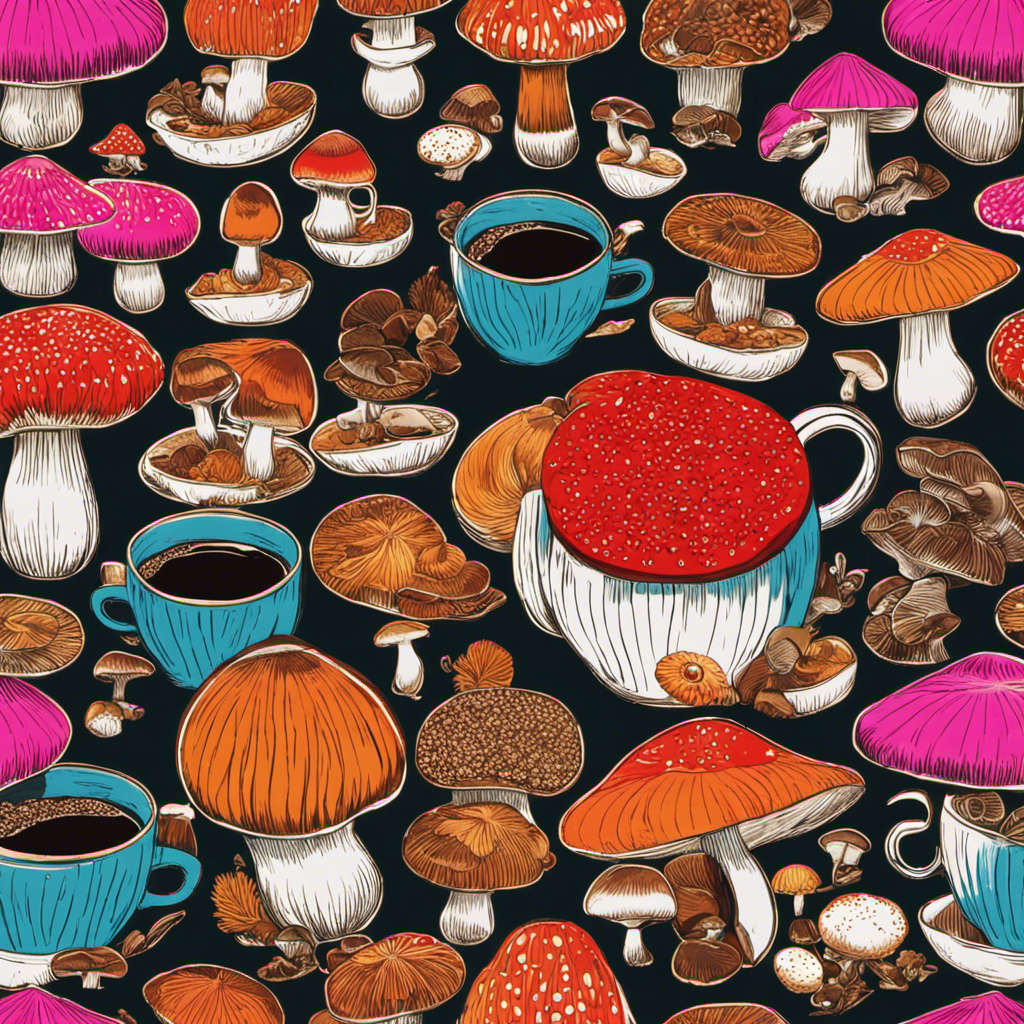
 Mushroom Coffee4 weeks ago
Mushroom Coffee4 weeks agoYour Ultimate Guide to Ryze Mushroom Coffee: 9 Things to Know
-

 Mushroom Coffee4 weeks ago
Mushroom Coffee4 weeks agoUnveiling the Puzzle: Top 10 Alternatives to Ryze Mushroom Coffee Revealed
-
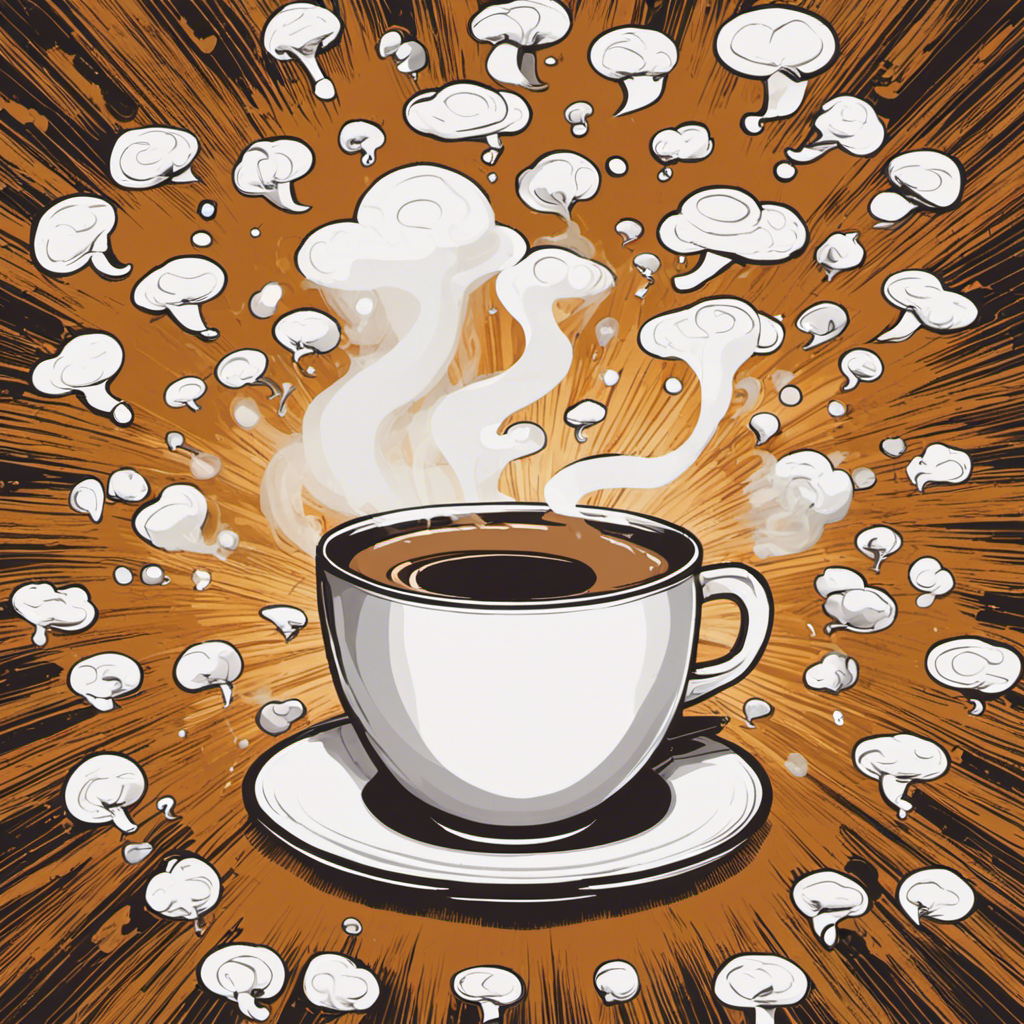
 Mushroom Coffee4 weeks ago
Mushroom Coffee4 weeks agoUnveiling the Mysteries of Ryze Mushroom Coffee: Top 10 Questions Answered
-

 Rooibos3 weeks ago
Rooibos3 weeks ago9 Essential Steps to Perfect Rooibos Tea: A Brewing Guide
-

 Coffee Basics4 weeks ago
Coffee Basics4 weeks agoHow Do Starbucks’ Seasonal Specialties Appeal to Customers?
-

 Mushroom Coffee4 weeks ago
Mushroom Coffee4 weeks ago3 Best Techniques to Brew Ryze Mushroom Coffee
-
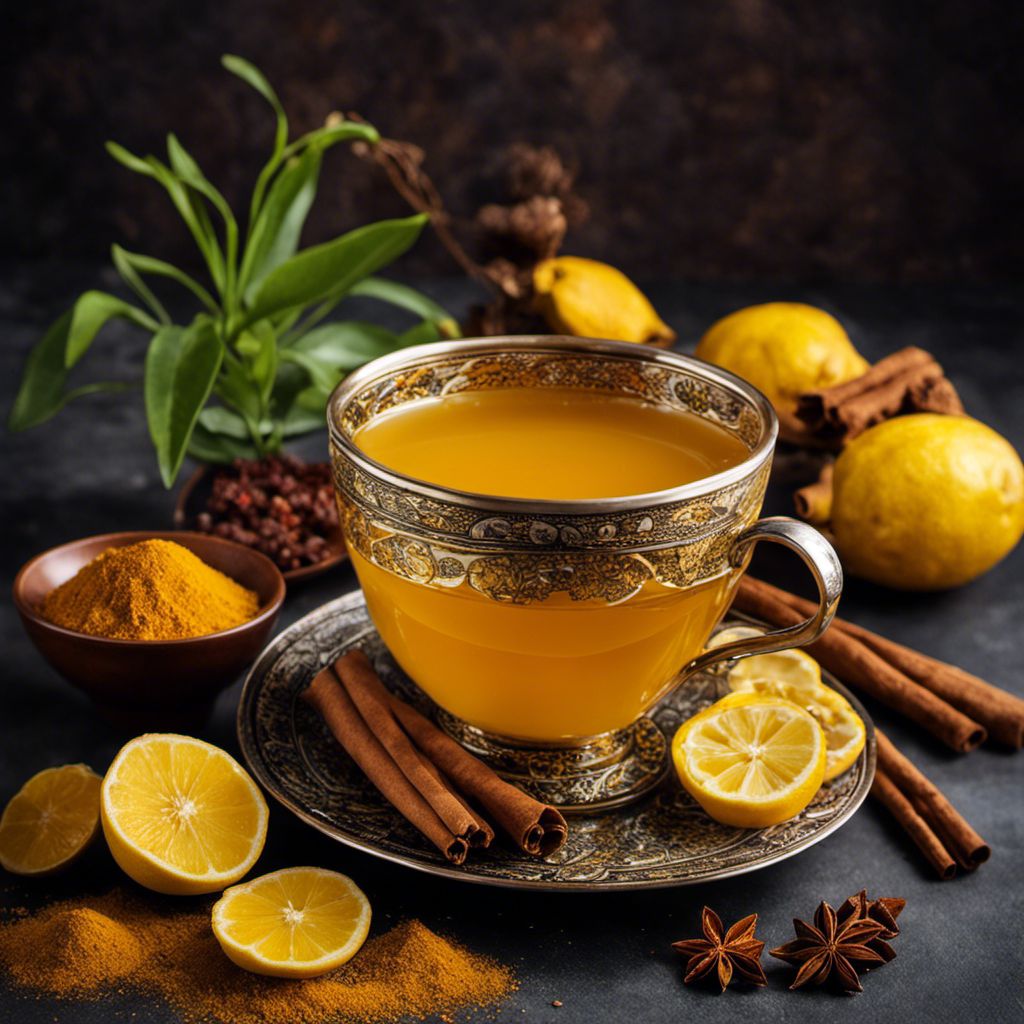
 Turmeric Tea3 weeks ago
Turmeric Tea3 weeks agoTurmeric Ginger, Cinnamon, Lemon, Honey Tea Benefits
-

 Mushroom Coffee4 weeks ago
Mushroom Coffee4 weeks agoIs Ryze Mushroom Coffee’s Caffeine Content More like Decaf or Regular Coffee?







